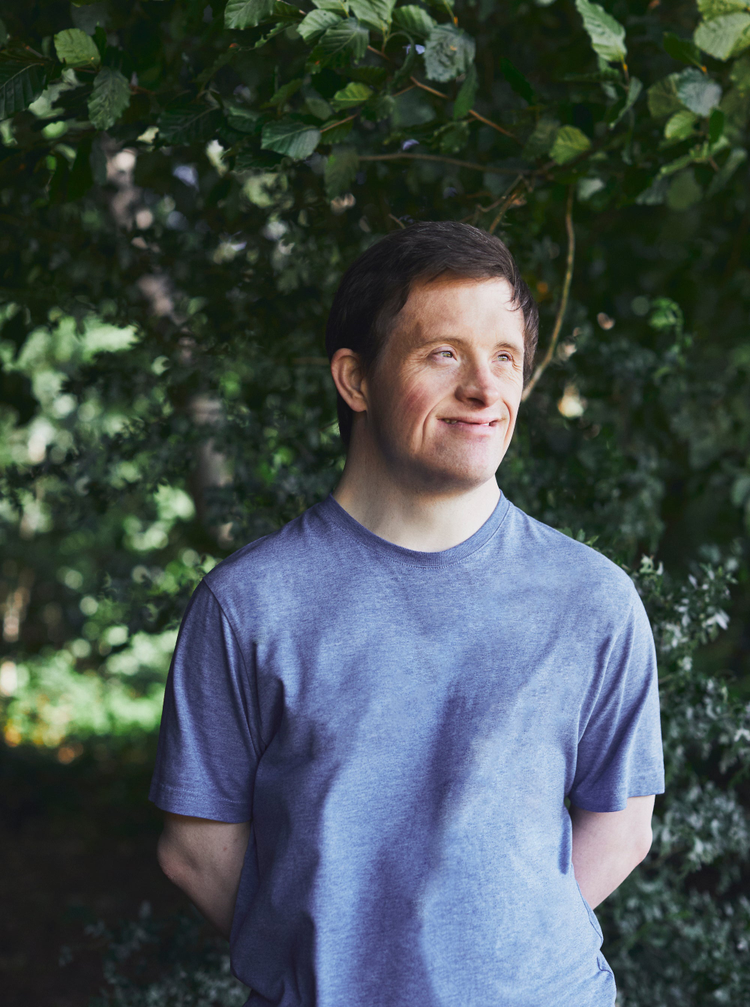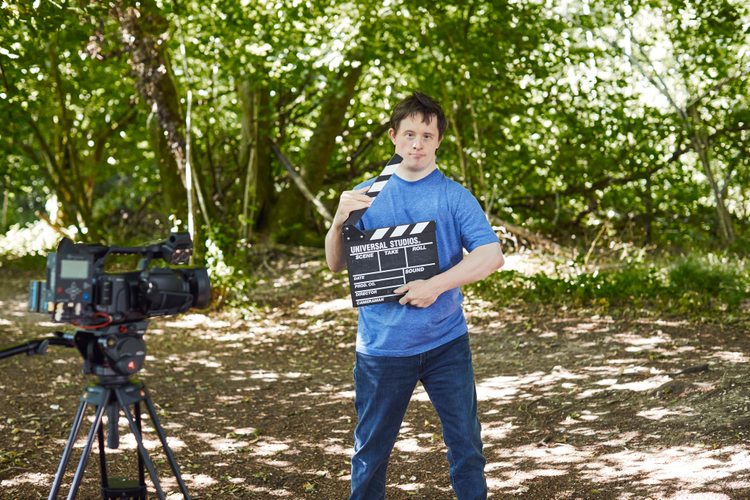‘People have outdated views about disabled performers’: Line of Duty’s Tommy Jessop on acting with Down’s syndrome

Tommy Jessop by Victoria Adamson
He’s been called ‘phenomenal’ by Mark Rylance, acted alongside Vicky McClure, played Hamlet, and taken part in critically acclaimed shorts, but Tommy Jessop believes there’s still much progress to be made in how the film industry treats disabled actors.
Tommy Jessop was 22 when he first saw a character with Down’s syndrome on screen. “It was … me!” he says with a grin, sitting in his family’s living room. In the BBC TV drama Coming Down the Mountain in 2007, Jessop played a disabled teenager despised by his older brother. It captured Jessop’s ability to fully realise his characters on screen. “Making viewers feel emotions is my passion in life,” says Jessop.
In person, the 36-year-old is animated company. There are many things Jessop thinks are either “brilliant” or “wicked”, including but not limited to: receiving an honorary doctorate in arts from the University of Winchester, his “top secret” new acting project, being a volunteer usher at the Theatre Royal, Callum Wilson and Allan Saint-Maximin from Newcastle United, Bradley Walsh’s The Chase, and presenting an award at the 2021 Bafta ceremony. His recent passion project is cooking, where he shares the results on Twitter with his nearly 30,000 followers. (“I’ve made flapjacks and cakes, shepherd’s pie and fish pie,” he says.)
“Keep on dreaming and believing. One day you really will reap the rewards of your hard work.”
Tommy Jessop, Actor
Jessop has made a career out of overcoming obstacles. Growing up in Hampshire, he developed a taste for the limelight appearing in junior school plays. “I enjoyed being the centre of attention,” he says. His mother, Jane, believed it might just be a phase but Jessop kept getting cast. After he left school, Jane founded Blue Apple Theatre, a group dedicated to assisting actors with learning disabilities in taking their next steps on stage.
Her son, never ducking a challenge, took the lead in the Blue Apple Theatre’s touring production of Hamlet. “That was one of my personal highlights in my career,” he remembers. “I learned how to sword fight and to do the famous speech, to be or not to be.” No less than former Royal Shakespeare Company legend Mark Rylance told Jessop his performance was “phenomenal”.
Jessop was fortunate enough to be selected from hundreds of applicants for the Talent Fund for Disabled Actors – a bursary scheme organised by the BBC, Channel 4 and the Actors Centre – which helps nurture talent by running sessions for young people with top directors and industry figures. He started getting key TV roles in medical dramas such as Casualty and Holby City, building up his confidence and knowledge of the craft. Critically acclaimed dramatic roles followed in short films such as Innocence and Fighter.
Without question, however, Jessop’s biggest role so far was playing Terry Boyle in “Line of Duty”, Jed Mercurio’s hugely popular TV crime thriller. In seasons five and six, Jessop plays an unwitting victim, who, through “mate crime”, is first tricked into storing a dead body in his freezer, then subsequently framed for murder. At one dramatic moment, Boyle is interrogated, then nearly drowned in a freezing lake. “Being on set was literally like being in a James Bond film,” is Jessop’s memory of his on-screen near-death experience, comparing the temperature to “living in Antarctica” and expressing his gratitude to his “brilliant” castmate Vicky McClure for giving him a hug to warm him up.
The results were viewed by 11 million people, including, to Jessop’s delight, the Queen. “I was literally speechless when I read that story,” he remembers. “It was really quite overwhelming.” The only drawback to appearing on a major BBC show was the ongoing health checks. “Well, you might let the Guinness World Records know: I took 21 Covid tests. It was very tough.” He clearly loved every other aspect of the experience – and was certainly not fazed by the description of his character as a “local oddball” by superintendent Ted Hastings. “This is showing the world what this ‘oddball’ is really capable of doing: in character I’ve even planned a murder!” says Jessop.
Asked what advice he would give other young actors with Down’s syndrome, Jessop believes you can be the agent of your own success. “Keep on dreaming and believing,” he says. “One day you really will reap the rewards of your hard work.” He believes passionately that disabled people need to be given chances to appear on screen, playing a wide variety of characters rather than merely timid victims or infantile objects of pity. “Look at the type of people I’ve played: a murderer, a fighter, a thief, a fisherman, a football fan …”
“I’m breaking down barriers because there was no writing for actors like me”
Tommy Jessop, Actor
Jessop warms to this theme. “People have outdated views about disabled performers. We have jobs and hobbies, we fall in love and out of love. Please let us show you what we can do in life and in film. If we are on screen, people will know that we can live interesting lives and have skills and talents.”
Jessop believes that we can expect to see more multifaceted performances in the future. “The biggest challenge is to persuade producers and showrunners to believe in performers like me. People making short films seem to believe in us and trust us as performers to create amazing work – people making feature films need to learn from them. Just let us play characters with the same hopes, dreams and adventures everyone else has!”
He feels there is so much more progress to be made. “I’m breaking down barriers because there was no writing for actors like me, because they didn’t know we could play the roles.” He is profoundly grateful for the industry support he has received, but issues something of a challenge: “I can play any role you throw at me. Just give me a chance.”

Tommy Jessop by Victoria Adamson
Hear more from diverse creators at Adobe Diverse Voices and check out Adobe Premiere Pro to you bring your stories to life.
This Content was originally published on theguardian.com as part of the Adobe and Guardian Labs Create Change campaign.